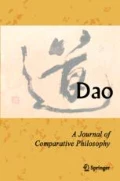Abstract
An important passage of the Analects (2.17) will be interpreted. It is perhaps the most important epistemological utterance in the work, yet it is not easy to interpret. Some interpretations are unacceptable because they render the passage trivial. Here we shall explicate the passage in line with contemporary virtue epistemology, so that it says something both interesting and insightful.
Similar content being viewed by others
References
Brooks, E. Bruce, and A. Taeko Brooks, trans. 1998. The Original Analects: Sayings of Confucius and His Successors. New York: Columbia University Press.
Legge, James, trans. 1893/2014. The Analects of Confucius. Adelaide: eBooks@Adelaide, University of Adelaide. https://ebooks.adelaide.edu.au/c/confucius/c748a/
Slingerland, Edward, trans. 2003. Confucius Analects: With Selections from Traditional Commentaries. Indianapolis: Hackett Publishing Co., Inc.
Author information
Authors and Affiliations
Corresponding author
Rights and permissions
About this article
Cite this article
Sosa, E. Confucius on Knowledge. Dao 14, 325–330 (2015). https://doi.org/10.1007/s11712-015-9450-1
Published:
Issue Date:
DOI: https://doi.org/10.1007/s11712-015-9450-1


